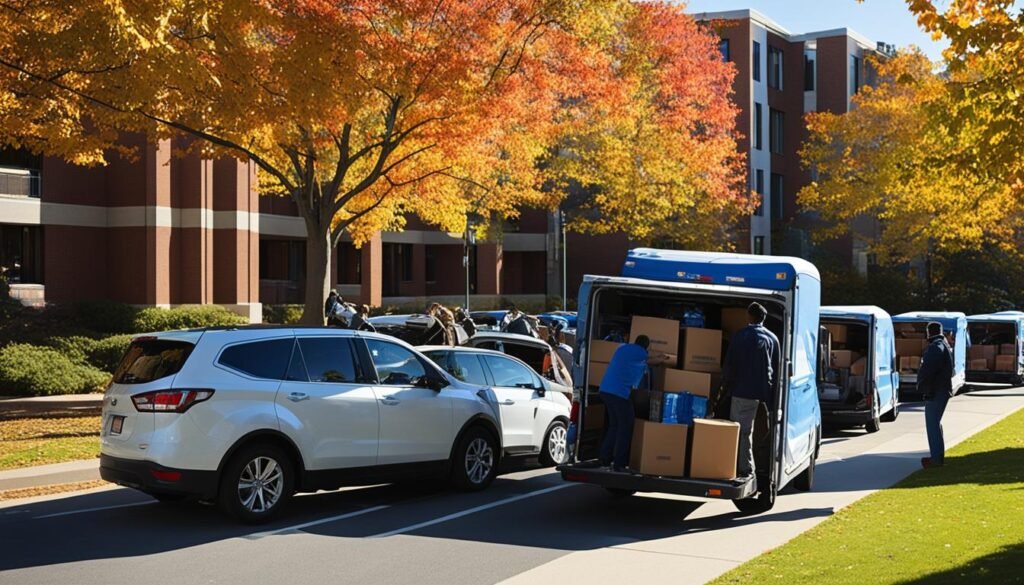Welcome to the exciting journey of adjusting to college life away from your hometown. As you embark on your freshman year, you’re stepping into a new environment filled with possibilities and opportunities. It’s completely normal to feel a mix of emotions, from excitement to anxiety, as you navigate this transition. But fear not, because in this article, we’ll provide you with essential strategies to help you adjust and thrive in your new academic and social setting.
Adjusting to college life away from home can be a transformative experience. It’s an opportunity to discover who you are, explore new interests, and make lifelong connections. With the right mindset and proper guidance, you can find your place in this unfamiliar territory and create a fulfilling college experience.
Throughout this article, we’ll address topics such as building a supportive community, exploring different moving options, planning ahead for a smooth college move, dealing with emotional challenges, creating a routine, and setting goals. These strategies will equip you with the tools you need to embrace change and make the most out of your college years.
Remember, you are not alone in this journey. Many students have experienced the same range of emotions and challenges when adjusting to college life away from their hometown. By implementing the strategies discussed in this article, you’ll be better prepared to navigate your new chapter and flourish in your new surroundings.
So let’s dive in and discover how you can adjust to college life away from your hometown and embark on a journey of personal growth and success!
The Importance of Building a Supportive Community
Adjusting to college life away from your hometown can be both exciting and challenging. One of the key factors in successfully navigating this transition is building a supportive community. It all begins with your freshman dorm, where you have the opportunity to meet and connect with fellow students who are going through similar changes.
By establishing meaningful connections with your dorm mates, you can create a sense of belonging and support. Engage in conversations, attend social events, and participate in activities within your dorm community. Building these relationships can help ease the feelings of homesickness and make the adjustment to college life much smoother.
Not only can your fellow residents become your close friends, but they can also serve as a support system during the ups and downs of college life. Whether it’s studying together, exploring the campus, or simply being there for each other, having a strong community within your dorm can contribute to your overall well-being and academic success.
In addition to fellow students, faculty members can also play a vital role in building a supportive community. Seek out mentors among the faculty who can guide you through your academic journey and provide valuable advice. They can offer insights into challenging courses, research opportunities, and even career advice.
However, it’s important to note that not all dorms may foster a strong sense of community. If you find that your dorm environment doesn’t provide the community-building opportunities you desire, don’t worry. There are alternative ways to create connections on campus. Consider joining clubs, organizations, or sports teams that align with your interests. These groups offer a chance to meet like-minded individuals and form friendships outside of your dormitory.
Exploring Different Moving Options
When it comes to moving for college, you have several options to consider to ensure a smooth transition to your new campus. Assessing your budget, location, and specific needs will help you determine the best moving option for you. Let’s explore the different college moving options available:
Rent a Moving Truck
If you have a lot of belongings to transport, renting a moving truck can be a cost-effective choice. With a moving truck, you have the flexibility to pack and transport your items at your own pace. It’s a great option if you prefer to have control over the moving process and want to save on costs.
Use a Moving Container
For long-distance moves or if you’re tight on time, using a moving container can provide convenience and flexibility. With a moving container, you can pack your belongings at your own pace and have them delivered to your new location. It’s a hassle-free option that eliminates the need to drive a truck and allows you to focus on settling into your new college life.
Hire Professionals
If you prefer a stress-free moving experience and have the budget to accommodate it, hiring professional movers is an excellent option. Professional movers have the expertise and equipment to handle your belongings with care and efficiency. They can streamline the moving process, allowing you to focus on getting acquainted with your new college environment.
Explore these college moving options carefully, weighing the pros and cons of each based on your specific circumstances. Whether you choose to rent a moving truck, use a moving container, or hire professionals, the key is to find a solution that aligns with your needs and helps you transition seamlessly into your college life.

Tips for a Smooth College Move
Moving to college is an exciting milestone in your life. To ensure a smooth transition, it’s crucial to plan ahead and make the necessary preparations. By following these tips, you can make your college move a stress-free experience:
- Plan Ahead: Start organizing your move well in advance. Create a checklist of tasks to complete, such as obtaining necessary documents, arranging transportation, and scheduling move-in dates.
- Determine What You Need: Take inventory of the items you’ll need for college. Be mindful of the limited space in dorm rooms, and focus on bringing essentials. Coordinate with your future roommates to avoid duplicate items.
- Organize Your Packing: Packing efficiently is key to a smooth move. Pack items in labeled boxes, grouping them by category or room. This will make unpacking easier once you arrive at your new residence.
- Consider Method of Transportation: Depending on the distance of your move, decide whether you’ll need to rent a small moving truck, utilize a moving container, or hire professional movers. Research your options and choose the most suitable one.
- Ask for Help: Moving can be a daunting task, so don’t hesitate to ask for assistance from friends and family. They can provide support during the packing, loading, and unloading processes.
- Stay Organized: Keep important documents, such as your college acceptance letter and identification, readily accessible. Make sure to also keep track of any necessary paperwork for dorm check-in or housing arrangements.

By planning ahead, organizing your packing, and asking for help when needed, your college move can be a smooth and successful transition. Embrace this exciting chapter in your life with confidence and enjoy the new opportunities that await you.
The Emotional Challenges of Adjusting to College Life
Adjusting to college life away from your hometown can be an exciting and transformative experience. However, it also comes with its fair share of emotional challenges. It’s natural to feel a range of emotions, including homesickness and feelings of isolation, as you navigate this new chapter of your life.
Remember, you are not alone. Many students go through similar challenges when adjusting to college life. It’s important to acknowledge and address these emotions to ensure a healthy and successful transition. Reach out to the campus resources available to you, such as counseling services or student support groups. These resources can provide guidance, understanding, and a supportive environment for you to express yourself.
Connecting with other students who may be experiencing similar challenges can also be incredibly beneficial. Seek out opportunities to meet new people and forge connections on campus. Join clubs or organizations that align with your interests, attend social events, and engage in activities that bring you joy. Building a sense of community and finding like-minded individuals can provide a sense of camaraderie and support.
Remember that homesickness is a common experience for many college students. It’s normal to miss the familiarity and comfort of your hometown. Stay connected with your loved ones through phone calls, video chats, or letters. Consider decorating your dorm room with items that remind you of home, like photographs or mementos.

Most importantly, don’t be afraid to seek help when you need it. Asking for support is a sign of strength, not weakness. College campuses have resources in place to assist students with the emotional challenges they may face. Take advantage of these resources and remember that your well-being should always be a top priority.
Creating a Routine and Setting Goals
Adjusting to college life away from your hometown can be both exciting and overwhelming. To make this transition smoother, it is crucial to establish a routine and set goals that align with your aspirations. By creating a structured daily schedule, you can effectively manage your academic responsibilities, social activities, and self-care.
Setting specific and measurable goals will give you a sense of purpose and direction as you navigate your new environment. Whether it’s achieving high grades, getting involved in campus organizations, or improving a particular skill, having clear objectives can keep you motivated and focused.
Effective time management is key to thriving in college. Prioritizing tasks based on their importance and deadlines will help you stay organized and avoid unnecessary stress. Avoid the temptation to procrastinate and break down your tasks into manageable chunks. This way, you’ll be able to tackle them systematically, leaving room for adequate breaks and relaxation.
Benefits of Creating a Routine and Setting Goals:
- Increased productivity and efficiency: A well-structured routine allows you to make the most of your time, ensuring you dedicate sufficient hours to studying, attending classes, participating in extracurriculars, and taking care of yourself.
- Enhanced focus and clarity: Having tangible goals provides you with a sense of direction, allowing you to prioritize your activities and make informed decisions.
- Reduced stress and overwhelm: By breaking down your tasks and allocating time for each, you can avoid last-minute rushes and feel more in control of your workload.
- Improved work-life balance: A routine that incorporates self-care activities ensures you have time for relaxation, exercise, socializing, and pursuing your hobbies, promoting overall well-being.

Remember, adjusting to college life is a journey that requires flexibility and adaptability. Utilize the power of routine and goal-setting to create a fulfilling and successful college experience.
Conclusion
Adjusting to college life away from your hometown can be a daunting prospect, but it’s also an incredible opportunity for personal growth and development. By embracing change and adopting the right strategies, you can not only survive but thrive in your new academic and social setting.
Building a supportive community is crucial in making a successful transition. Connect with your fellow students in your freshman dorm and seek out mentors among the faculty who can guide you along the way. If your dorm doesn’t foster a strong sense of community, don’t be discouraged. There are plenty of other ways to build connections on campus, such as joining clubs and organizations that align with your interests.
Exploring different moving options can help alleviate the stress of the move itself. Whether you choose to rent a moving truck, use a moving container, or hire professionals, consider your budget, location, and specific needs to make the best decision for you. By planning ahead, organizing your packing, and asking for help when needed, you can make your college move a smooth and hassle-free experience.
Adjusting to college life also comes with emotional challenges, such as homesickness and feeling isolated. It’s important to address these emotions by reaching out to campus resources, such as counseling services or student support groups. Remember, seeking help is a sign of strength, and connecting with other students who may be experiencing similar challenges can provide a sense of support and belonging.
Finally, creating a routine and setting goals can help you navigate the demands of college life. Establish a daily schedule that accounts for academic responsibilities, social activities, and self-care. By practicing effective time management techniques and prioritizing tasks, you can maintain a healthy balance and achieve academic success.
As you embark on this new chapter in your life, remember that it’s a journey filled with countless opportunities for growth and self-discovery. Embrace the change, adjust to your new surroundings, and make the most out of your college experience. With the right mindset and strategies, you have the potential to thrive and create lasting memories that will shape your future.
Source Links
- https://www.dukechronicle.com/article/2024/01/011924-reis-quadex-failing
- https://www.newyorker.com/magazine/2024/01/22/the-birth-of-my-daughter-the-death-of-my-marriage
- https://www.movebuddha.com/blog/ways-to-move-to-college/


